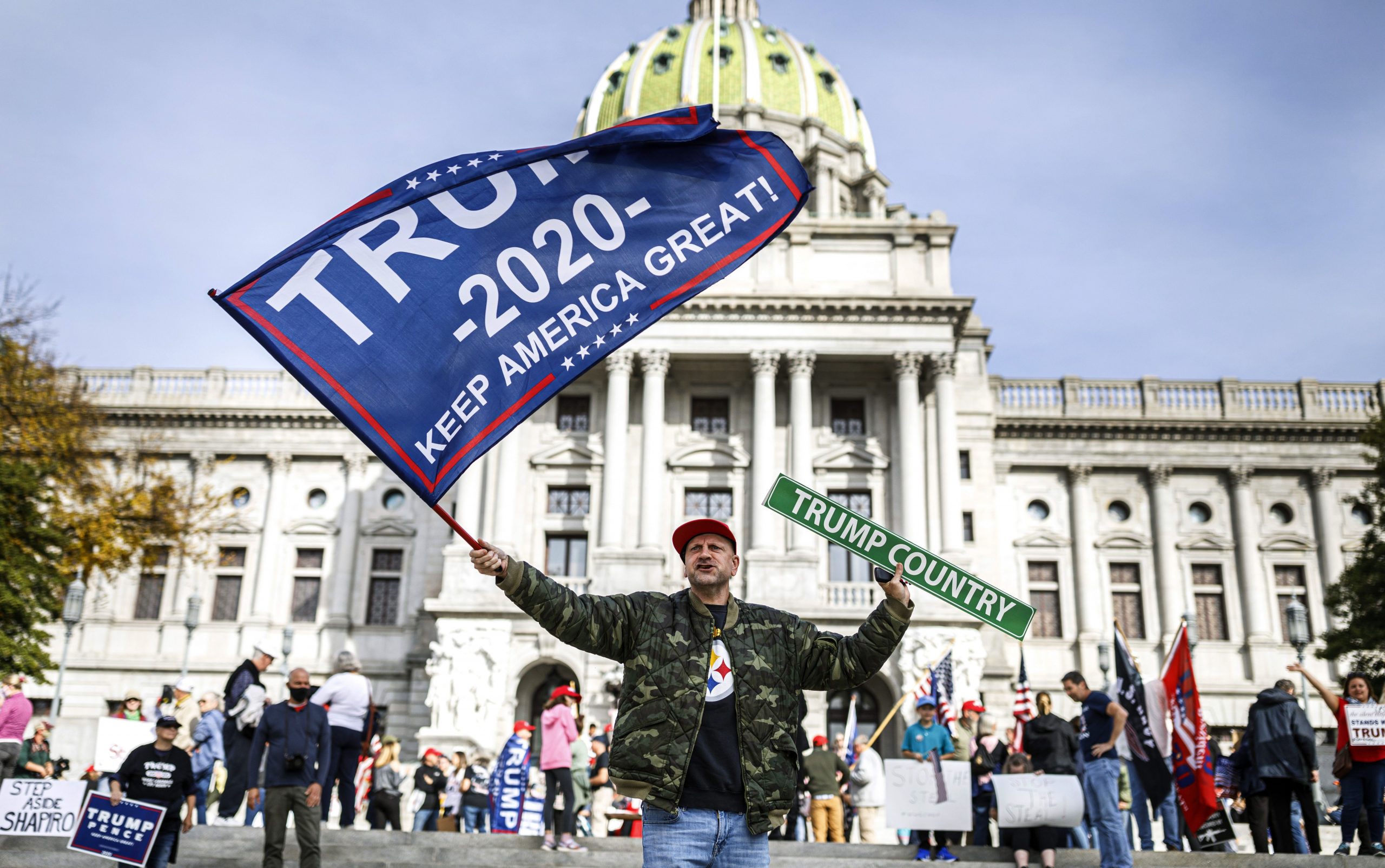WASHINGTON — President Donald Trump and some of his Republican supporters are testing out a rallying cry for his uphill fight to reverse the lead that Joe Biden holds in key battleground states: count all “legal” votes.
The language is freighted with a clear implication, namely that Democrats want illegal votes counted, a claim for which there is no evidence.
But it underscores Trump’s strategic imperatives as Biden closes in on securing the 270 Electoral College votes needed to win the presidency, tactics that are rooted more in political messaging than legal precedent.
“It’s not the use of the word ‘legal’ vote, it’s the constant insinuation that there are so many illegal or fraudulent votes out there,” said Rick Hasen, a professor of law and political science at the University of California Irvine and author of the Election Law blog. “There’s no evidence produced by the campaign to support there has been a lot of fraud.”
Even Trump’s own administration has pushed back at the claims of widespread voter fraud and illegal voting – though it didn’t mention Trump was the one making the allegations. The Cybersecurity and Infrastructure Security Agency, federal agency that oversees U.S. election security, also noted local election offices have detection measures that “make it highly difficult to commit fraud through counterfeit ballots.”
Top election officials in the battleground states of Arizona, Georgia, Michigan, Pennsylvania and Nevada – both Republican and Democrat – have all said they see no widespread voting irregularities, no major instances of fraud or illegal activity. The count is slow – but that was to be expected, because a record number of people voted by mail this year in the coronavirus pandemic.
That has not stopped the chorus of Republican leadership arguing all legal ballots must be counted, including from the Governor of Georgia, freshly re-elected Sen. Susan Collins of Maine, and the Vice-President. Democrats and Biden, on the other hand, has stuck with: “Every vote must be counted.”
Gabriel Sterling, a top Georgia elections official and a Republican, said Friday the process was public and transparent, with many safeguards and backed up with “paperwork on top of paperwork in many cases.”
Meanwhile, Republican national chairwoman Ronna McDaniel appearing at a rally with Georgia Trump supporters, without offering specifics, said the GOP has heard “reports” of “irregularities” in Georgia. She called for “patience” so that such instances could be “investigated.” Pressed for examples, she said there were “six or seven,” but did not elaborate.
So many of the ballots this season came via mail over fears of the virus, which is spiking across the U.S. There are numerous safeguards for those ballots built into the system to ensure that only voters eligible to vote can do so and that they cast only one ballot.
This includes updated voter rolls to remove voters who have died or have moved out of state, counting only ballots that were sent in by registered voters and, in some states, matching signatures on ballots to ones on file at the local election office.
Election officials say that when fraud does happen, people are caught and prosecuted and it typically involves someone wanting to honour the wishes of a loved one who recently died and either knowingly or not commits a crime by filling out that ballot. An election judge from southern Illinois was charged in 2016 with voter fraud after she filled out a ballot for her late husband because she said he would have wanted Trump to be president.
So far, there has been no evidence offered by Trump – or anyone else – of widespread fraud that would some how affect the outcome of the race. That hasn’t stopped the campaign from filing allegations.
A judge in Georgia dismissed a case by state Republicans and the Trump campaign this week that essentially sought to ensure state laws are being followed on absentee ballots, rising concerns about 53 ballots. Local officials testified that those ballots had all been received on time.
A statewide appellate court judge in Pennsylvania on Friday dismissed a request to stop the state or counties from counting provisional ballots that were cast by voters whose mail-in ballots were disqualified by a technicality.
In Nevada, a lawsuit alleges that ineligible votes were cast in the Las Vegas area, the biggest Democratic stronghold in an otherwise predominantly GOP state.
The lawsuit cites two examples: a woman who said she was turned away from voting in person because a mailed ballot had been cast with her signature, and a political strategist who said he was denied an opportunity to observe ballot counting late on election night.
“Nothing that I’ve seen regarding the election raises a legal issue that could succeed. There is just is nothing there,” said Barry Richard, who represented George W. Bush in the 2000 recount in Florida that ended up before the U.S. Supreme Court. “When these kind of lawsuits are filed it just breeds contempt for the whole legal system,” he said.
Even if Trump did have credible evidence that there may have been fraud, he would have to show that it impacted enough ballots to make a difference in the election, Richard said.
“Courts don’t take up cases just to waste time,” he said.
___
Richer reported from Boston. Associated Press Writers Ken Ritter in Nevada, Corey Williams in Detroit, Bill Barrow, Kate Brumback, Christina A. Cassidy and Ben Nadler in Atlanta, Anthony Izaguirre in Lindenhurst, New York and Ben Fox in Washington contributed to this report.
Colleen Long And Alanna Durkin Richer, The Associated Press
















